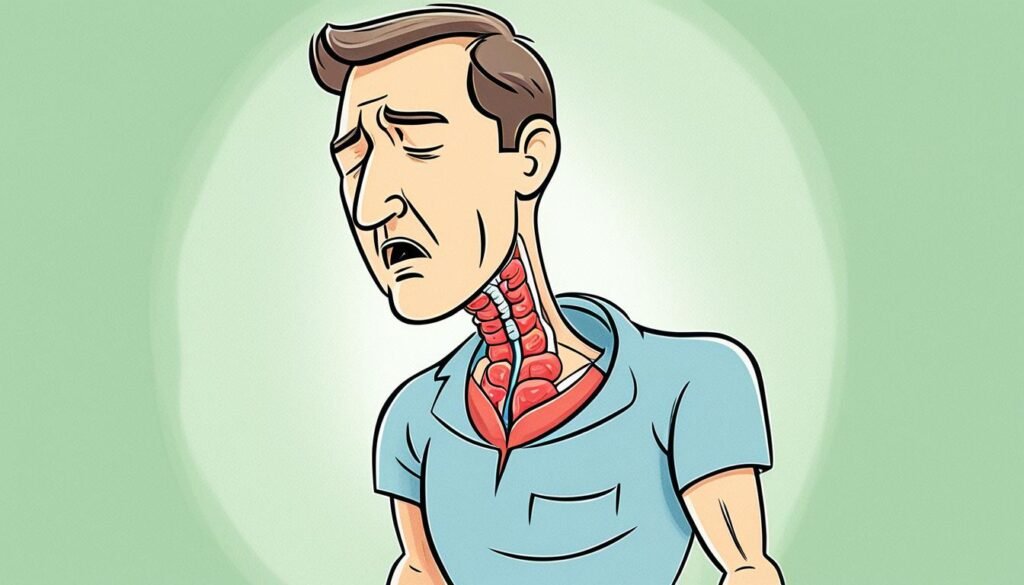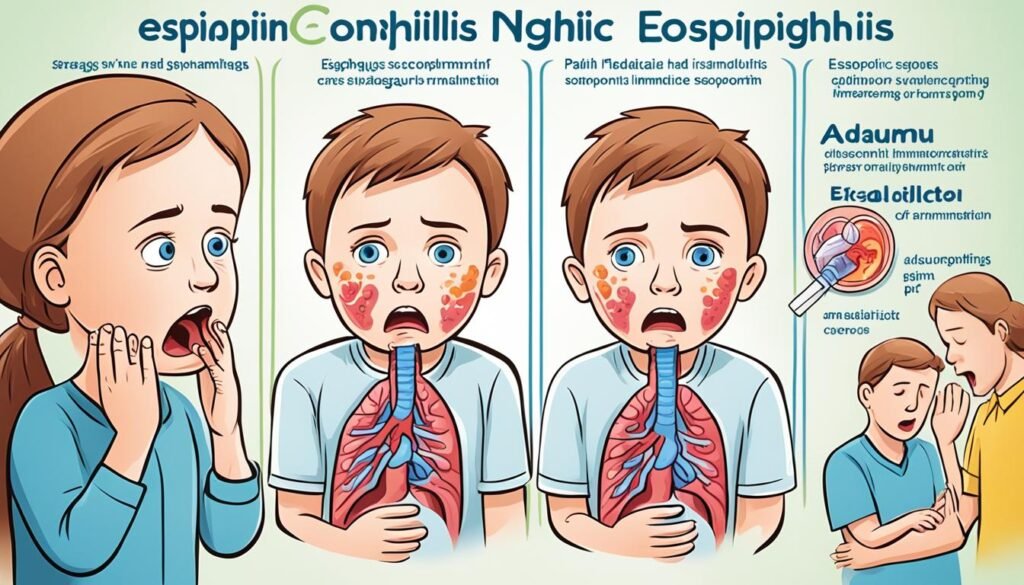Eosinophilic esophagitis is a chronic immune condition that affects the esophagus, causing inflammation and leading to a variety of symptoms. If you or a loved one are experiencing symptoms such as difficulty swallowing, chest pain, heartburn, or regurgitation, it’s important to consider the possibility of eosinophilic esophagitis.
Table of Contents
ToggleIn this article, we will explore the common symptoms of eosinophilic esophagitis, from gastrointestinal issues to allergic symptoms. By understanding these signs, you can take proactive steps towards early detection and effective management of this chronic condition.
Gastrointestinal Symptoms
Eosinophilic esophagitis often presents with Gastrointestinal Diseases Symptoms. These may include difficulty swallowing (dysphagia), chest pain, heartburn, regurgitation, and sometimes, food getting stuck in the esophagus (food impaction).
These gastrointestinal symptoms can be uncomfortable and interfere with daily life. Symptoms of eosinophilic esophagitis can vary from person to person, but they often share commonalities. Let’s take a closer look at each of these symptoms:
1. Difficulty Swallowing (Dysphagia)
Dysphagia, or difficulty swallowing, is one of the hallmark symptoms of eosinophilic esophagitis. It can feel like food is getting stuck in the throat or chest, causing discomfort or pain during swallowing. This can lead to a reluctance to eat or drink and may result in weight loss or malnutrition if not addressed.
2. Chest Pain
Chest pain is another common symptom of eosinophilic esophagitis. It is often described as a burning or squeezing sensation in the chest area. The pain may be mistaken for heart-related issues, such as angina, but it is important to consider eosinophilic esophagitis as a potential cause, especially if the pain is associated with other gastrointestinal symptoms.
3. Heartburn
Heartburn is a common symptom experienced by many individuals with eosinophilic esophagitis. It is characterized by a burning sensation in the chest or throat, often after meals or when lying down. This symptom can be managed with lifestyle modifications and medication. For more information What Does Heartburn Feel Like? click here.
4. Regurgitation
Regurgitation refers to the backward flow of stomach contents into the throat or mouth. In eosinophilic esophagitis, this can occur along with other symptoms, such as difficulty swallowing and heartburn. It can be distressing and may contribute to further complications, such as dental issues.
5. Food Impaction
The most severe gastrointestinal symptom of eosinophilic esophagitis is food impaction. This occurs when the esophagus becomes narrowed and food becomes stuck, causing intense pain and discomfort. It often requires immediate medical intervention to remove the impacted food and relieve symptoms.
Understanding and recognizing these gastrointestinal symptoms is essential for identifying and diagnosing eosinophilic esophagitis. If you experience any of these symptoms, it is important to consult with a healthcare professional for proper evaluation and management.

Allergic Symptoms
Many individuals with Eosinophilic Esophagitis Disease also experience allergic symptoms. These can include seasonal allergies, eczema, asthma, and allergic rhinitis. Understanding the connection between eosinophilic esophagitis and allergies can be crucial in managing the condition effectively.
Eosinophilic esophagitis is a chronic immune condition that affects the esophagus. While its primary symptoms involve the gastrointestinal system, such as difficulty swallowing and food impaction, it can also manifest in various allergic symptoms. Individuals with this condition often have a history of seasonal allergies, which can worsen their esophagus-related symptoms. The presence of eczema, characterized by inflamed and itchy skin, is another common allergic symptom in eosinophilic esophagitis patients.
Asthma, a chronic respiratory condition causing breathing difficulties, is often seen in conjunction with eosinophilic esophagitis. The two conditions share underlying immune responses, and their coexistence is not uncommon. Allergic rhinitis, or hay fever, which causes symptoms like sneezing, congestion, and itchy eyes due to allergens, can also be observed in individuals with eosinophilic esophagitis.
Recognizing and addressing these allergic symptoms is vital in managing eosinophilic esophagitis. Controlling seasonal allergies and eczema can help alleviate esophagus-related symptoms. Optimal management of asthma is also crucial to prevent exacerbation of both respiratory and esophageal symptoms. A comprehensive approach that takes into account both the gastrointestinal and allergic aspects of eosinophilic esophagitis is key to effectively managing the condition and improving the overall quality of life for individuals affected by it.
Allergic Symptoms and Eosinophilic Esophagitis
The allergic symptoms experienced by individuals with eosinophilic esophagitis provide valuable insights into the underlying immune processes at play. The connection between allergies and eosinophilic esophagitis highlights the complex interactions between the immune system, the gastrointestinal tract, and allergens. Ongoing research aims to further elucidate these connections and develop targeted therapies that address both the gastrointestinal and allergic components of eosinophilic esophagitis.
Pediatric Symptoms
Eosinophilic esophagitis is a condition that can affect individuals of all ages, but it is particularly common in children. Detecting the symptoms in children is crucial for timely diagnosis and management. Here are some of the symptoms experienced by pediatric patients with eosinophilic esophagitis:
Feeding Difficulties
Children with eosinophilic esophagitis may have difficulty with feeding. They may experience discomfort or pain while eating, leading to a decrease in appetite or refusal to eat certain foods. Mealtime can become a stressful experience for both the child and their caregivers.
Poor Weight Gain
Another symptom commonly observed in pediatric patients with eosinophilic esophagitis is poor weight gain. The inflammation in the esophagus can impair the absorption of nutrients, leading to inadequate weight gain or even weight loss in some cases. Regular monitoring of the child’s growth and weight is essential to identify any abnormalities.
Abdominal Pain
Abdominal pain is a common complaint among children with eosinophilic esophagitis. The inflammation and narrowing of the esophagus can cause discomfort or pain in the stomach area. The pain can vary in intensity and may be persistent or intermittent.
It is important for parents and caregivers to be aware of these symptoms and consult a healthcare professional if they suspect their child may have eosinophilic esophagitis. Early diagnosis and appropriate management can help alleviate the symptoms and improve the child’s quality of life.

Conclusion
In conclusion, recognizing the symptoms of eosinophilic esophagitis is crucial for early detection and effective management of this chronic immune condition. By seeking medical attention and being aware of the specific symptoms associated with eosinophilic esophagitis, you can take proactive steps towards improving your quality of life.
Eosinophilic esophagitis can present with a range of symptoms, including gastrointestinal issues such as difficulty swallowing, chest pain, heartburn, and food impaction. Additionally, many individuals with this condition also experience allergic symptoms like seasonal allergies, eczema, asthma, and allergic rhinitis. This highlights the importance of understanding the connection between eosinophilic esophagitis and allergies.
For children, it is important to be aware of the pediatric symptoms of eosinophilic esophagitis, which can include feeding difficulties, poor weight gain, and abdominal pain. Timely recognition and management of these symptoms can significantly improve the quality of life for pediatric patients.
By staying informed about the symptoms of eosinophilic esophagitis and working closely with healthcare professionals, you can effectively navigate the challenges associated with this condition and ensure the best possible care for yourself or your loved ones.
FAQ
What are the common symptoms of eosinophilic esophagitis?
The common symptoms of eosinophilic esophagitis include difficulty swallowing (dysphagia), chest pain, heartburn, regurgitation, and occasional food impaction where food gets stuck in the esophagus.
Are there any allergic symptoms associated with eosinophilic esophagitis?
Yes, many individuals with eosinophilic esophagitis also experience allergic symptoms such as seasonal allergies, eczema, asthma, and allergic rhinitis.
Does eosinophilic esophagitis mainly affect children?
While eosinophilic esophagitis can affect individuals of all ages, it is particularly common in children. Children with eosinophilic esophagitis may experience feeding difficulties, poor weight gain, and abdominal pain.
Why is it important to recognize the symptoms of eosinophilic esophagitis?
Recognizing the symptoms of eosinophilic esophagitis is crucial for early detection and effective management of the condition. Seeking medical attention and understanding the specific symptoms can help individuals take proactive steps towards improving their quality of life.
About The Author

Medically reviewed by Dr. Nivedita Pandey, MD, DM (Gastroenterology)
Senior Gastroenterologist & Hepatologist
Dr. Nivedita Pandey is a U.S.-trained gastroenterologist and hepatologist with extensive experience in diagnosing and treating liver diseases and gastrointestinal disorders. She specializes in liver enzyme abnormalities, fatty liver disease, hepatitis, cirrhosis, and digestive health.
All content is reviewed for medical accuracy and aligned with current clinical guidelines.
About Author | Instagram | Linkedin





